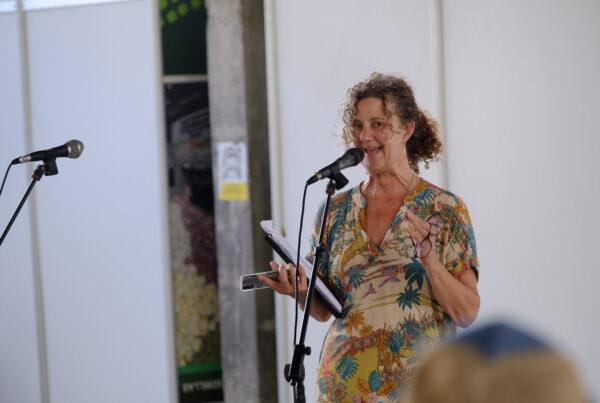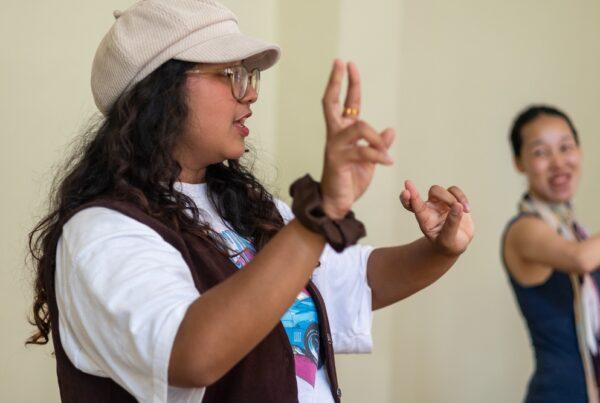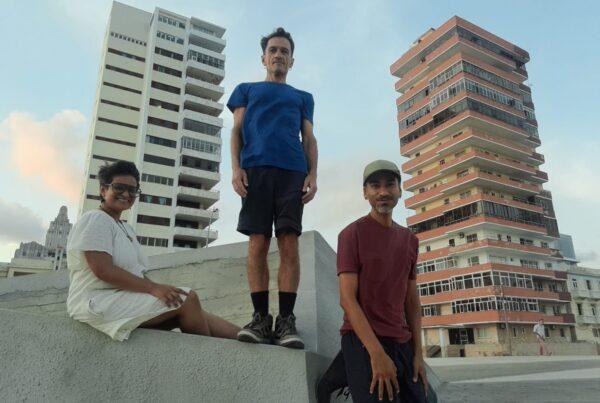I’m glad I went to see Prehistoric Girl as the last performance of the Artistic Gathering, for many performances throughout the festival required a keen eye to follow the translation in order to follow the plot. Prehistoric Girl is performed in a made up language, a new language that the director and actors came up with as a conscious decision to poignantly prove that a language can be universal.
The play itself is a story about a prehistoric civilisation and its relationships and customs, inspired by Desanka Maksimović’s most successful prose work for older children. Addressed to ages 6 and above, the initial play is a play-metaphor about eternal childhood, but also a document about the childhood of human civilisation.
Essentially a puppet play, with awesome puppeteering by Una Beić, Predrag Grujić, Nataša Milišić, Danilo Mihnjević, Snežana Popov, Olgica Trbojević Kostić and Miroslav Maćoš and directed by Sonja Petrović, the plot revolves around Gava (Una Beić) who is fighting for her place in society, in which she is helped by a boy called Buk (Predrag Grujić). The duo has a contagious chemistry between them and speak the ‘invented language’ as if it was our own. Much of their world relies on nature, after all, in this play nature is everything and this is instrumentally transmitted not just through the plot but the production as well (the production team has worked to have the least environmental footprint as possible – 95% of props on stage derives from nature, and for the materials being used in the performance to be reused, recycled, or returned to nature after its conclusion).
As for the plot, one walks away with the concrete understanding that nature is not something that ‘should just be saved, it’s part of us and reminds us just how estranged we have got from it. At the same time, it’s also a story about a brave and talented Gava and her fight to find a place in her community. With nature as an ally, it is society that holds her back from achieving her vision – to become a healer. Through Gava’s journey, the play handles notions of death and perseverance in an elegant manner, while Gava’s triumph is subtly conveyed.
Following the play, a Q&A revealed that the Gava’s obstacle in becoming a healer was the fact that she was a woman, a thematic the director wanted to address, just as Desanka did her work. The actors also described the creation of their own language. As they rehearsed they had created some 30 words to work with, and eventually reduced them to around 10 words, a formidable exercise and insight into alternative means of communication.
Sonja Petrović is a multi award-winning theatre director based in Serbia and is the CEO of The Festival of Ecological Theatre for Children and Youth which takes place in Bačka Palanka (Serbia). She is one of the founders of the regional platform for the development of TYA entitled, ‘From the First Step’. Since 2022, she has been a member of the executive board of ASSITEJ Serbia and is engaged with the Next Generation Network as a member of its steering group. She is also currently studying for her PhD.

Melissa Hekkers is a freelance journalist and author.
Her most recent book, Amir’s Blue Elephant, a creative non-fiction based on her experiences working in the Moria refugee camp in Lesvos, Greece and Cyprus. In 2018, she launched the My Cyprus Mandala Series, colouring books inspired by the natural and cultural heritage of Cyprus. In 2007, she published her first children’s book in both English and Greek entitled Crocodile, which won the Cyprus State Illustration Award. In 2012, she launched her second children’s book Flying across Red Skies (in English and Greek), using an experimental approach to literature, for which she was nominated for the Cyprus State Literary award. Her third, similarly well-received children’s book was Pupa (Greek and English), published in 2014 and was adapted as a theatre play in 2019. In between her last two books, she published her first free-verse poetry book entitled Come-forth. In 2019 she was contributing author to the anthology Nicosia Beyond Barriers: Voices from a Divided City, published by Saqi Books, London.





